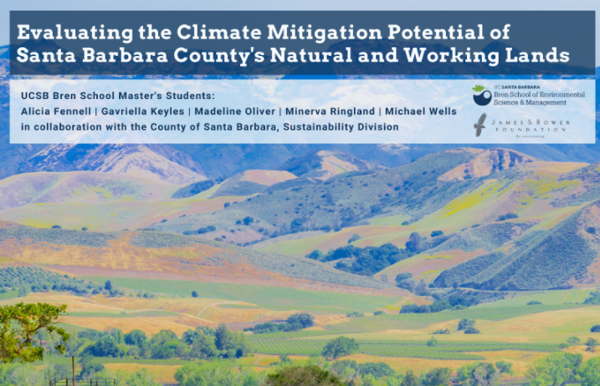- Data Basin |
- Use Cases |
- Santa Barbara County Landscape Carbon Accounting
Santa Barbara County Landscape Carbon Accounting

Explore related items…
Evaluating the Climate Mitigation Potential of Natural & Working Lands in Santa Barbara County
Natural and working lands (including rangeland, forests, wetlands, farmland, and more) cover more than 85% of Santa Barbara County, and are vital not only to the county’s environment, but also to the economy and the well-being of residents. Natural and working lands can serve as major carbon sinks, but can become carbon sources depending on how they are managed. This project assesses the potential of natural and working lands in the county to contribute to the County of Santa Barbara's greenhouse gas emissions reduction goals and the State’s carbon-neutrality goals.
We are a group of Master's Students from the Bren School of Environmental Studies and Management, UCSB. We drew on the approach demonstrated by Resilient Merced. We quantified existing carbon stocks on the county’s natural and working lands and projected future sequestration that could result from implementing climate-smart land management practices. Based on this analysis, we recommend management strategies that the County of Santa Barbara can implement to preserve existing carbon sinks and promote carbon sequestration in the future, while also protecting valuable economic and natural resources.
In this case study, we show the data sources and spatial analysis that fed into our projections. To learn more about our findings and methodology, visit our project website, check out our Final Report or executive summary!
- Citation
- SB Atlas Admin. 2021. Santa Barbara County Landscape Carbon Accounting. In: Data Basin. [First published in Data Basin on Jun 3, 2021; Last Modified on Jul 6, 2021; Retrieved on Feb 14, 2026] <https://databasin.org/articles/07efa4e5a5554b33896f0764245ac1ec/>
About the Author
The purpose of the Blueprint is to provide a public data platform and common language to support in depth conversations and decisions about our shared aspirations. This collaborative project aims to describe the current landscape, natural resources, and community values about land in Santa Barbara...

